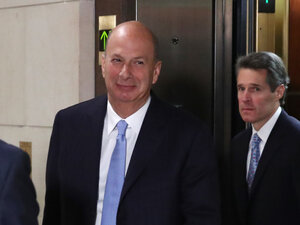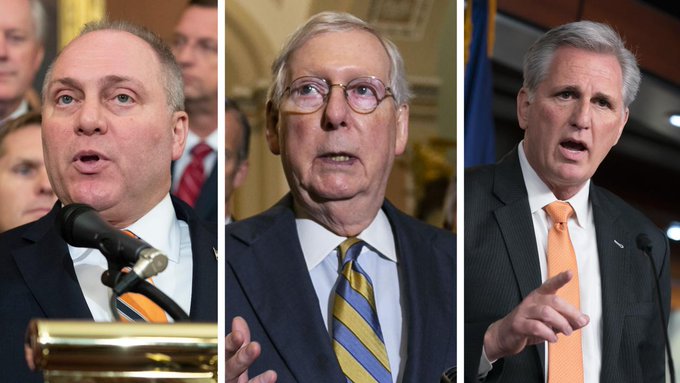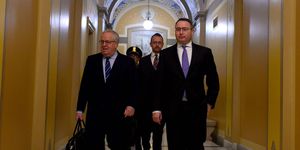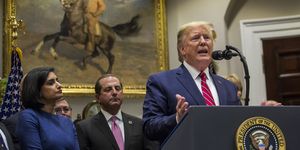WATCH LIVE: Sondland: Ukraine Aid Link Reflected Trump's 'Desires And Requirements'

Updated at 9:19 a.m. ET
Gordon Sondland, the U.S. ambassador to the European Union, tied President Trump directly to the U.S. push for conditioning military aid to Ukraine and a meeting with the Ukrainian president with "a public statement from President Zelensky committing to investigations of Burisma and the 2016 election."
"Mr. Giuliani expressed those requests directly to the Ukrainians," Sondland said in his opening statement at the public impeachment hearings on Wednesday. "Mr. Giuliani also expressed those requests directly to us. We all understood that these prerequisites for the White House call and White House meeting reflected President Trump's desires and requirements."
Sondland also provided the most explicit link yet of the secretary of state's role in the Ukraine affair, saying he kept Mike Pompeo and other senior State Department officials abreast of his contacts with Giuliani who "specifically mentioned the 2016 election (including the DNC server) and Burisma as two topics of importance to the president."
"They knew what we were doing and why," Sondland said of Pompeo and the others in his opening statement at the public impeachment hearings on Wednesday.
Sondland, a major donor to Trump's inauguration, has emerged as a pivotal witness as the Democrats attempt to make the case that the president sought an investigation into the Bidens from Ukraine's newly elected president in exchange for the resumption of military aid and a White House visit. Trump denies any such linkage was made.
Sondland also said he merely "followed the president's orders" in working with Giuliani, even though he, Energy Secretary Rick Perry, and Kurt Volker, the then special envoy to Ukraine, "did not want to work with" the president's personal lawyer. "Simply put, we played the hand we were dealt," he said.
If "I had known of all of Mr. Giuliani's dealings or of his associations with individuals now under criminal indictment, I would not have acquiesced to his participation," Sondland said. "Still, given what we knew at the time, what we were asked to do did not appear to be wrong."
Sondland previously told House investigators that he delivered a key message to a Ukrainian official this year: Trump would not unfreeze more than $390 million in assistance for Ukraine unless Ukraine made a public statement committing to investigations Trump believed might help him in the 2020 election.
That revelation was included in a three-page addendum filed this month to the first deposition Sondland gave in the earlier, closed-door chapter in the Ukraine affair.
Initially the ambassador didn't discuss that episode, which took place Sept. 1 in Warsaw. But the testimony of others, Sondland said, "refreshed" his recollection and accordingly he amended his testimony.
Indispensable man
The encounter in Poland is one of a number of episodes in the Ukraine affair in which Sondland was a star.
Another was a July 10 meeting at the White House at which a Ukrainian delegation pressed for a meeting between the new president, Volodymyr Zelenskiy, and Trump.
Then-national security adviser John Bolton was cool to the idea, witnesses have said. He declined to commit. But Sondland said, according to others, that he already had an agreement with acting White House chief of staff Mick Mulvaney for a meeting with Trump — if the Ukrainians agreed to investigations.
Bolton and the national security professionals within the White House staff objected not only to having been boxed out of the shadow channel to Ukraine, but the merits of Trump's strategy.
Sondland also is one of the actors in the drama who can speak directly about what he heard from Trump.
Witnesses have said that Sondland talked frequently with Trump by phone — even though that went outside the normal policy process — and the ambassador even dialed up the president on his mobile phone from a restaurant table this summer in Kyiv.
Sondland was following up after the previous day's phone call between Trump and Zelenskiy. Another witness has told House investigators that he overheard Trump ask Sondland about the investigations he wanted.
Zelenskiy would do them, Sondland said, according to foreign service officer David Holmes, who was at the table across from Sondland. Holmes, who is posted to U.S. Embassy Kyiv, is scheduled to appear at Thursday's impeachment hearing.
The afternoon panel
The witnesses scheduled to appear on Wednesday afternoon have much lower profiles.
One is Laura Cooper, a deputy assistant secretary at the Defense Department, whose portfolio includes policy for Eastern Europe.
She's expected to describe the Pentagon's opposition to the White House's freeze on Ukraine assistance and her conversations with Ambassador Kurt Volker, who testified on Tuesday, about the anticorruption statement.
The other is David Hale, undersecretary of state for political affairs at the State Department. Hale is expected to give the Washington foreign policy perspective on the events of this year, including the scourging and removal of then-U.S. Ambassador to Ukraine Marie Yovanovitch, who was recalled in an early phase of the saga.
Hale told House investigators that when people were appealing to Secretary of State Mike Pompeo to support Yovanovitch — which he ultimately declined to do — he agreed to call Fox News host Sean Hannity and ask about the "evidence" that might be problematic for Yovanovitch.
Hale said he had been beyond the periphery of many of the events in the story. For example, he said he was surprised to read the White House's account of the July 25 phone call in which Trump asked Zelenskiy for a "favor."
"It did surprise me," Hale said. "I didn't know any of that was happening."












